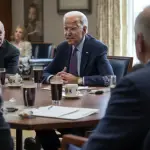In a recent commentary, Governor Tim Walz of Minnesota ignited a firestorm by expressing his views on the Electoral College, calling for its abolition. This call came in the midst of escalating discussions regarding the electoral process in the United States, and it quickly drew the attention of conservative commentators and political analysts alike. Walz’s push for abolishing the Electoral College came during campaign fundraisers, where he emphasized a preference for a national popular vote instead of the current system. This stance has been a recurring theme in Walz’s statements as he campaigns as Vice President Kamala Harris’ running mate.
The governor’s stance raises eyebrows for a couple of reasons. First and foremost, it showcases a perceived weakness in understanding the very fabric of American democracy. The Electoral College was established by the Founding Fathers to balance the influence of populous areas against less populated ones, ensuring that every state’s voice matters in a federal system. Simply put, it prevents a few densely populated cities from deciding the fate of the entire nation. When Walz remarked that the Electoral College “needs to go,” it sounds less like an enthusiastic embrace of democratic values and more like a grudging admission that he fears losing under the current system.
Walz’s candidacy begs a hypothetical question: What if he wins the popular vote but still falls short in the Electoral College? It appears that this scenario has made him uncomfortable, as he now scrambles to justify his position. His implicit acknowledgment of the possibility of this electoral outcome suggests his focus is less on fair representation and more on securing the keys to the White House, ensuring his party’s advantage despite how the population makes its preferences known across the states.
The governor’s remarks also show a striking lack of faith in the electorate. Rather than trusting that voters can make informed choices—whether they come from Minneapolis or rural Minnesota—Walz seems to promote the idea that only the popular vote should count. This dismisses the complexities of American politics. Voters in smaller states might feel like their contributions are less valued, and if the focus shifts purely to populous areas, the unique needs of these populations could easily be ignored. Is it really wise to trade representation for simplistic notions of democracy?
While there’s humor in watching public figures trip over their own misstatements, this issue is far from trivial. The push to undermine the Electoral College could lead to long-lasting ramifications for our political landscape. Democrats like Walz should consider what they might wish for. In this topsy-turvy environment, turning the electoral process upside down might just lead to a game nobody wants to play—especially when that game is played without the safeguards that the founding documents intended.
In conclusion, the Electoral College is more than a mechanism for electing a president; it is a fundamental element in maintaining balance and fairness in a diverse nation. As Walz and others push for its dismantling, conservatives must continue to remind the public of the potential dangers that lie in changing such an integral part of our democracy. Ensuring that every voice matters, regardless of geography, is what drives the essence of American governance—however uncomfortable that may make some politicians feel.




